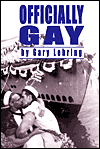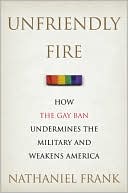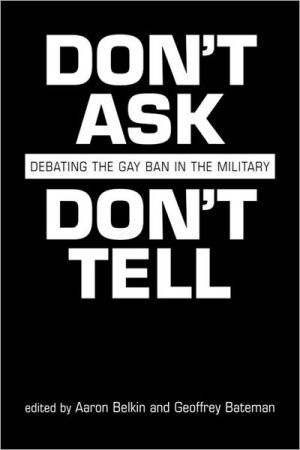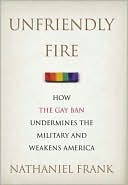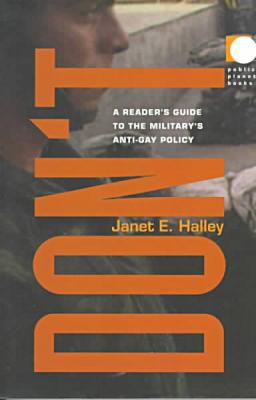Officially Gay: The Political Construction of Sexuality by the U. S. Military
In 1993, simply the idea that lesbians and gays should be able to serve openly in the military created a firestorm of protest from right-wing groups and powerful social conservatives that threatened to derail the entire agenda of a newly elected President. Nine short years later, in the wake of September 11, 2001, the Pentagon's suspension of discharge of gay and lesbians went largely overlooked and unremarked by political pundits, news organizations, military experts, religious leaders and...
Search in google:
In 1993, simply the idea that lesbians and gays should be able to serve openly in the military created a firestorm of protest from right-wing groups and powerful social conservatives that threatened to derail the entire agenda of a newly elected President. Nine short years later, in the wake of September 11, 2001, the Pentagon's suspension of discharge of gay and lesbians went largely overlooked and unremarked by political pundits, news organizations, military experts, religious leaders and gay activists. How can this collective cultural silence be explained? Officially Gay follows the military's century-long attempt to identify and exclude gays and lesbians. It traces how the military historically constructed definitions of homosexual identity relying upon religious, medical, and psychological discourses that defined homosexuals as evil, degenerate, and unstable, making their risk to national security obvious, and mandating their exclusion from the Armed Services. Officially Gay argues that this process made possible greater regulation and scrutiny of gays and lesbians both in and out of the military while simultaneously helping to create a gay and lesbian political movement and helped shape the direction that movement would take. Publishers Weekly In this impassioned treatise, Lehring argues that military policies towards gays and lesbians have played a major role in the creation of what he terms an "official" gay identity-namely, "who and what lesbians and gay men are." The opportunity to defend one's country is a hallmark of citizenship, explains Lehring; thus, an individual who is deemed unfit for military service based on his sexual orientation is, in many ways, stripped of some of his rights and privileges as an American. Ambitious but accessible, the text begins with a survey of definitions of gay identity, covering what Lehring terms the essentialist/constructivist debate (i.e., those who believe sexuality is innate and irreducible, and those who believe it is a social construct) and the potential for the former to lead to "greater State regulation of sex." Lehring goes on to examine issues such as gays' place in the "hypermasculine atmosphere" of the military (where gay men might be perceived to objectify their male comrades) and to debunk arguments that homosexuality is "incompatible" with military service. He also explores Clinton's wishy-washy "Don't Ask, Don't Tell, Don't Pursue" policy, and, perhaps most notably, considers how the military's epistemological models of homosexuality have actually shaped the contemporary gay liberation movement. At the heart of Lehring's discourse is the armed forces' contradictory practice of banning homosexuals except during times of war: if gays and lesbians pose such a threat to the military's ability to accomplish its mission, why, he asks, should they be permitted to serve in times of war, when peak performance is even more essential? It's a question that still doesn't have an answer, and Lehring's book is an important examination of a critical issue. (July) Copyright 2003 Reed Business Information.
AcknowledgmentsIntroduction11What Is an Official Gay Identity?92The Emergence of Identity: Epistemological Tenets of the Modern Gay and Lesbian Subject343Gays in the Military: Constructing the "Homosexual" Other724Gays in the Military: Identity as "Official" Justification for Exclusion1005Gaze in the Military: Competing Perceptions of Gay Performance1246Don't Kiss and Tell in the Military: Gay Politics and the Clinton Compromise1377Becoming Identity: Public Policy, Gay Identification, and the "Queer" Response149Conclusion: Nightmares, Fantasies, and Sexual Performance179Notes191Index223
\ Publishers WeeklyIn this impassioned treatise, Lehring argues that military policies towards gays and lesbians have played a major role in the creation of what he terms an "official" gay identity-namely, "who and what lesbians and gay men are." The opportunity to defend one's country is a hallmark of citizenship, explains Lehring; thus, an individual who is deemed unfit for military service based on his sexual orientation is, in many ways, stripped of some of his rights and privileges as an American. Ambitious but accessible, the text begins with a survey of definitions of gay identity, covering what Lehring terms the essentialist/constructivist debate (i.e., those who believe sexuality is innate and irreducible, and those who believe it is a social construct) and the potential for the former to lead to "greater State regulation of sex." Lehring goes on to examine issues such as gays' place in the "hypermasculine atmosphere" of the military (where gay men might be perceived to objectify their male comrades) and to debunk arguments that homosexuality is "incompatible" with military service. He also explores Clinton's wishy-washy "Don't Ask, Don't Tell, Don't Pursue" policy, and, perhaps most notably, considers how the military's epistemological models of homosexuality have actually shaped the contemporary gay liberation movement. At the heart of Lehring's discourse is the armed forces' contradictory practice of banning homosexuals except during times of war: if gays and lesbians pose such a threat to the military's ability to accomplish its mission, why, he asks, should they be permitted to serve in times of war, when peak performance is even more essential? It's a question that still doesn't have an answer, and Lehring's book is an important examination of a critical issue. (July) Copyright 2003 Reed Business Information.\ \ \ \ \ Library JournalThough it may seem like yesterday's news, the issue of "gays in the military" continues to be played out. The Pentagon's "stop loss" order after 9/11 means that the "don't ask, don't tell" policy of 1993 is in abeyance even though there have been some high-profile dismissals. Both of these books cover much the same ground. Both give excellent introductions to the history of U.S. military policy toward gays, and both provide detailed analyses of the flaws of the policy and are aimed at academic readers. Don't Ask, Don't Tell is the result of a symposium held in December 2000 at the Center for the Study of Sexual Minorities in the Military at the University of California, Santa Barbara, where Belkin and Bateman are director and assistant director, respectively. The text, which is mostly given to transcripts of sessions from the conference, raises the main issues provoked by the policy, such as a soldier's privacy, group cohesion, and the relevance of foreign experiences. Position papers are followed by discussion. Surprisingly, given the format, the process is quite focused. The editors acknowledge their failure in attracting proponents of the ban, though they tried hard to do so. Officially Gay is less policy oriented. Instead, it places military policy in the broader context of culture, using cultural theory to analyze how the policy contradicts itself. More importantly, it shows how the military has varied its stance according to circumstances and used identity as its organizing principle, neglecting distinctions between sexual actions and sexual identities. In this way, Lehring (government, Smith Coll.) makes concrete the essentialist/constructionist debates, which often get obscured by dense theory. Both books belong in academic libraries where there is interest in military affairs.-David Azzolina, Univ. of Pennsylvania Libs., Philadelphia Copyright 2003 Reed Business Information.\ \
